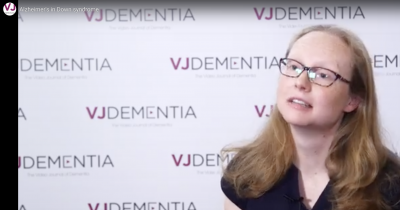On this page, you will find our newsletters and updates relevant to Down syndrome and the LonDownS Consortium. For general news relating to Down syndrome, we recommend the Down Syndrome Association's news page on their website.
Newsletters
- Easy-read winter newsletter 2017
- Carer and participant winter newsletter 2017
- Carer and participant winter newsletter 2016
- Academic summer newsletter 2016
- Carer and participant winter newsletter 2015
- Academic summer newsletter 2015
- Carer and participant winter newsletter 2014
- Academic summer newsletter 2014
- Carer and participant winter newsletter 2013
Dr Frances Wiseman explains dementia and Down syndrome
In an interview with the Video Journal of Dementia, Dr Frances Wiseman talks about her research - in only 1.50 minutes!
Click here to hear her talking about the relationship about Alzheimer disease and Down syndrome, or click here to learn about the role of chromosome 21 genes in Alzheimer disease.
HEROES - A new grant to study the common causes of dementia
Researchers at the Institute of Psychiatry, Psychology & Neuroscience (IoPPN) at King’s College London will be working with partners across Europe on a new project to identify common causes of dementia in Alzheimer’s Disease, Parkinson’s Disease and Down syndrome.
Read the coverage from King's Health Partners here or explore the Heroes Website!
Lunch time lecture by Harriet and Dr Frances Wiseman
To conclude the WDSD 2019 celebrations, Harriet and Dr Frances Wiseman gave a talk for the Lunch Hour Time series organised by UCL.
To see the full video of Harriet sharing her experience of living with Down Syndrome and Dr Wiseman talking about her research on Down syndrome and Alzheimer disease, click here!
WDSD 2019 Celebration by the LonDownS Consortium - Blog Post
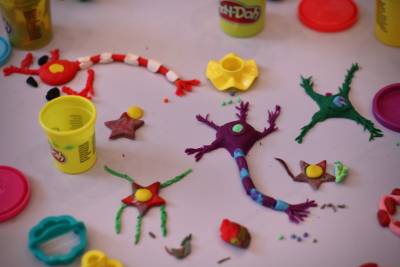

It is now the third year that the LonDownS Consortium celebrates World Down Syndrome Day with a science communication event for people who have Down syndrome, their families and carers. The event, hosted in the state-of-the-art Francis Crick Institute in London, had three goals: to thank people with Down syndrome and their families for taking part in research, to update them on the progress that our research has made, and to ask for feedback on our future research plans.
Many volunteers on the day were members of the LonDownS Consortium. The Consortium is formed of a diverse group of scientists, clinicians and developmental psychologists who have a common goal to understand and develop treatments for the early onset of dementia in people who have Down syndrome. This year we were joined by colleagues from University College London, the Francis Crick Institute and Kings College London, who are working to understand the development of heart defects in babies who have Down syndrome and how this impacts brain development and function, and the changes in learning and memory that arise from Down syndrome.
Some of the volunteers ran different activities such as looking at flies and plants using accessible microscopes, so that people who have Down syndrome could see how scientists study living things. Early career researchers helped attendees make different brain cells with Play-doh to explain how the cells work in the brain and help us think and remember. The team from the Crick organised a matching chromosome cards game and Lego chromosomes exhibit to communicate what trisomy of chromosome 21 is and how we can model this in mice. The LonDownS clinical team helped participants make memory books for things that are important to them. Finally, our colleagues from Kings imaging team used 3D hearts and brains to help people understanding how the heart and brain develop in people who have Down syndrome. Interested attendees were also taken on a guided tour of the Crick’s 2019 exhibition “Craft and Graft” by members of the Crick team.
Other volunteers gave talks about their research: Ms Claudia Cannavo (University College London) talked about cellular changes that occur in Down Syndrome, Dr Rifdat Aoidi (Francis Crick Institute) spoke about heart defects associated with the condition, Dr Ana Baburamani (King’s College London) and Ms Olatz Ojinaga (Birkbeck College) gave an overview about brain development in babies with Down syndrome, and Dr Sarah Pape (King’s College London) talked about the challenges of growing old with the condition. The research talks, chaired by Dr Frances Wiseman, were closed by Professor Andre Strydom (King’s College London) who told the participants more about the LonDownS study and its results.
The highlight of the day, however, was the talk given by James, a young man with Down syndrome who shared his experience of living with the condition. Using pictures to describe his life, James spoke about his childhood and youth, his friends and family that have always supported him, the jobs he has had, his love for rugby, and the importance of religion in his life. James' dream is to be on TV, and everyone could see, as he confidently owned the stage and cracked jokes throughout his presentation, that he has the perfect personality for it! It is not all roses though: James also talked about the pain and frustration of being seen as only his disability, rather than as the person he is.
This is the main point of World Down Syndrome Day, after all: to help us remember that people with Down syndrome are people first of all, capable of amazing achievements, with hopes and dreams as everybody else. And to remind us scientists about the people science works for, and what research can do to contribute to all our lives.
Claudia Cannavo
PhD student at the Institute of Neurology (UCL) and member of the LonDownS Consortium
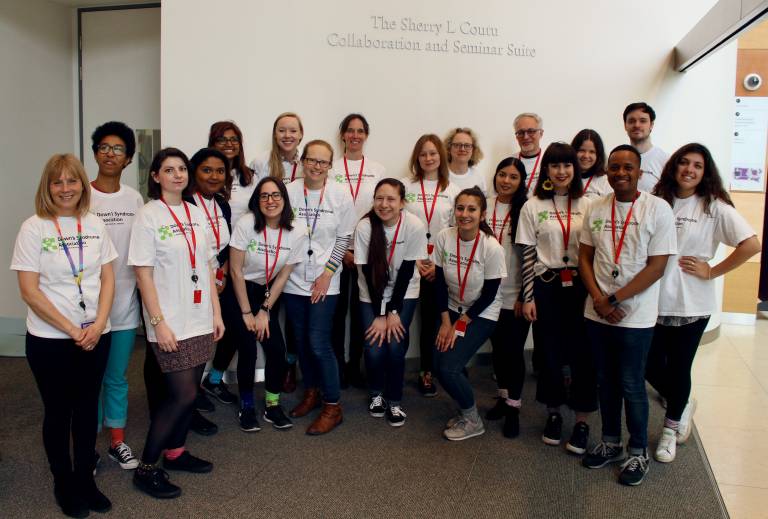
Blog post about our 2018 World Down Syndrome Day celebration
'What are you proud of?'
'Everything'
That's how Harriet answered one of the numerous questions arising from her talk, where she shared her experience of living with Down syndrome. Harriet is 45, lives in her own supported living flat within bus-distance of her parents' house, she works at a museum and a cinema (she didn't like 'The Shape of Water' either, by the way), and she goes to church on Sundays.
On the 24th of March, we held our celebration to mark World Down Syndrome Day 2018 (21st March). The day was all about a bridge between science and everyday life, organised by the LonDownS Consortium. It was a way to say thank you to all those people that, by taking part in our studies, allow us to add knowledge to our understanding of Down syndrome and how Alzheimer's disease develops in people who have Down syndrome.
Imagine a big open space, full of different stalls where, after a pizza lunch, people with Down syndrome and their families, friends, and carers learnt about the different parts of the brain by wearing brain-shaped caps, building memory books, and got to know more about chromosomes using puzzles and games.
In a separate room, Carla, Hana, and Rifdat presented the results of their research. How is it done? How is it useful? How will it help me? The room was packed: everybody wanted to have a chance to see the scientists' research progress, and to ask questions that Google couldn't answer. In a third room, students just starting out on their research journey shared their passion for the brain with participants by using Play-Doh to model the way brain cells connect to think and create memories. Alongside this, younger children were offered entertainment in a pinwheel of colours, bubbles, and music.
For a few hours on a Saturday afternoon, in the state-of-the-art Francis Crick Institute, scientists and people who have Down syndrome had the chance to chat and share each other's everyday experiences. What was the purpose? For our participants; to feel closer to science and the ways their participation can help us to learn and to solve seemingly impossible problems. To us scientists; to remind us that our ultimate goal lies beyond all the data, cells, numbers and pathways to the people in that room, and the possibility that we can positively affect their lives.
Written by Claudia Cannavo, PhD student at UCL
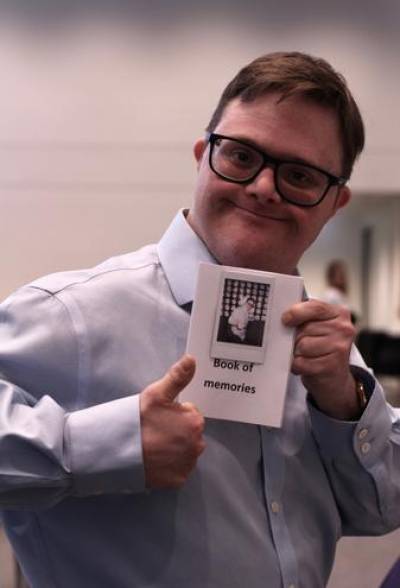
This is a photograph of one of our attendees and the memory book he made at our event
New research confirms that people with Down syndrome who develop dementia may benefit from commonly used anti-dementia drugs
A new study has shown that the treatment of individuals with Down syndrome and dementia with anti-dementia drugs can help maintain cognitive abilities (including memory) and increase survival, compared to individuals not given drug treatment. This study is important because people with Down syndrome have often been excluded from drug trials, and therefore there has been very little information to guide treatment decisions. The study also revealed significant regional differences in the proportions of people with Down syndrome who receive anti-dementia drugs.
Our adult team have moved!
The LonDownS adult team have moved from the Division of Psychiatry at UCL to the Institute of Psychiatry, Psychology and Neuroscience (IoPPN) and King's College London. Congratulations to LonDownS co-founder and Principal Investigator Prof Andre Strydom on his new role!
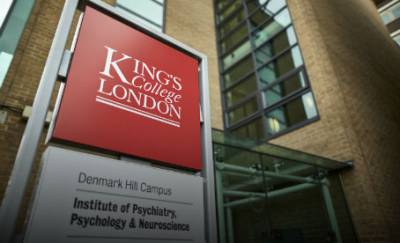
World Down Syndrome Day 2017 with the LonDownS Consortium
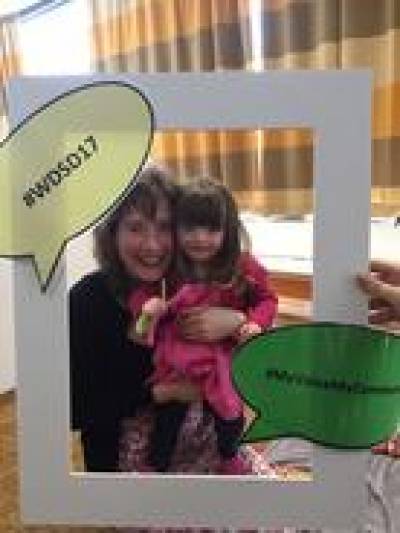
On Tuesday 21st March 2017, the LonDownS Consortium celebrated World Down Syndrome Day 2017 by hosting an educational activity day for participants, carers, family & friends and a short series of talks about our work later in the afternoon.
Thank you to everyone who came to our #WDSD2017 events in London and helped to make the day entertaining, fun and useful. It was lovely to see you all again and to meet some new faces.
We were lucky enough to have about 30 guests on the day so we had plenty of people to fill our photo booth (see the photo on the right)! We know that several of you had 3D photographs of you taken by the visiting researchers from the University of Oxford. Thank you to those of you who took part in this. The 3D pictures should be on their way to you shortly.
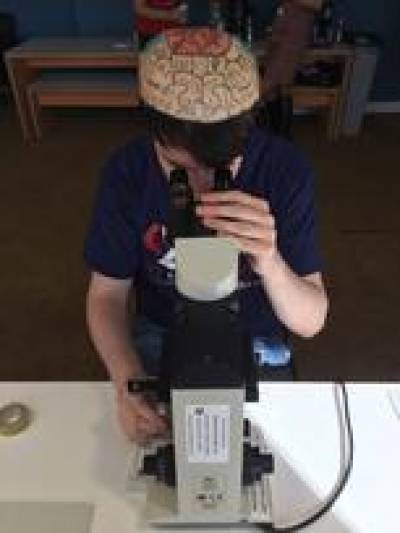
During the day we had several other activities: making PlayDoh neurons, making a memory tree, looking at cells through microscopes and making brain hats. On the left is Justin, one of our PhD students, showing us how to use the microscope (and modelling a brain hat!).
Later in the afternoon we had excellent talks from Dr Carla Startin, Dr Frances Wiseman, Professor Dean Nizetic and Professor John Hardy about our ongoing work. The picture below shows Carla (whom many of you will have met) giving her talk. Carla talked to us about what Down syndrome is and some of the reasons why so many people with Down syndrome develop dementia. She also gave us an update of her findings from the study so far and was able to describe some of the main characteristics of the group of people we have seen so far. Carla showed us some graphs of cognitive abilities across the lifespan at a population level and highlighted that cognitive decline seems to start in the mid to late forties for most of the tasks we've used. There were some genetic variations associated with this decline from our preliminary analyses.
As our analysis goes on, we will update you with what we're finding both on this website and through publications in scientific journals.
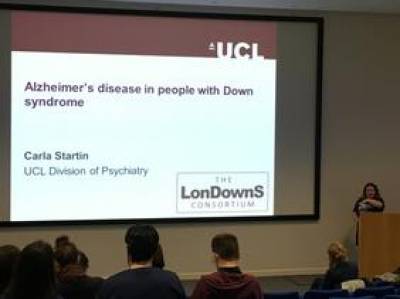
Professor Elizabeth Fisher features on BBC's 100 Women
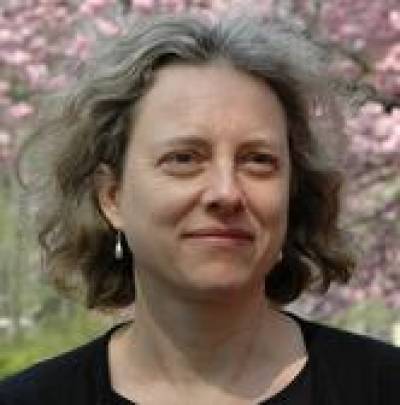
Professor Elizabeth Fisher, the Principal Investigator of LonDownS mouse modelling team recently featured on the BBC's 100 Women theme.
Professor Fisher, in 2005, along with Professor Victor Tybulewicz (Co-Investigator of the mouse modelling team) sucessfully transplanted a human chromosome (chromosome 21) into a mouse for the first time.
In the feature on BBC World Service's Witness programme, Professor Fisher discusses the work and her science career. Well worth listening to! The programme is still available on BBC iPlayer.
Archived news
- Claims that stem cells 'treat' Down syndrome have no basis
There have been claims made recently that injecting stem cells from individuals with two copies of chromosome 21, rather than the three found in DS, have been made. Some 'clinics' have been advertising this 'therapy' which has caused alarm in the DS research community.
The New Scientist have published an article discussing these claims and Professors Elizabeth Fisher and Victor Tybulewicz were invited to give their comments on these claims. Neither Professor Fisher nor Professor Tybulewicz believe the claims have any scientific support or that the injection of disomic stem cells has any therapeutic benefit.
You can read the full article appearing in the New Scientist by using the hyperlink.
- In memory of Professor Annette Karmiloff-Smith
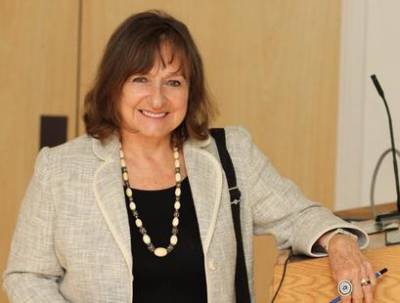
We regretfully bring you the sad news that Professor Annette Karmiloff-Smith, the leader of our infant workstream, has passed away after a long battle with illness. Annette passed peacefully just before Christmas, surrounded by her family.
Professor Karmiloff-Smith was a hugely influential seminal thinker in the field of child development. She began her career as a UN translator in Geneva but her interests soon turned to the emergence of language in children.
She trained in Geneva under Barbel Inhelder and Jean Piaget. Her first article in 1975 (If you want to get ahead, get a theory!) encapsulated her view that understanding cognitive processes was the key to understand the child's developing abilities. Annette always emphasised the importance of development itself when trying to understand both typically and atypically developing children (Development itself is the key to understanding developmental disorders, 1998). Under this view, typical and atypical development are construed as different life trajectories driven by the same underlying mechanisms. This theoretical work led her to take substantial steps forward in understanding the abilities of children with William's and Down syndromes. Finally, in later years her work focused on understanding the complex epigenetic interactions involved in brain organisation across early development.
Professor Karmiloff-Smith was also a prolific author and co-author of very influential books. Her most notable scientific books Beyond Modularity: A Developmental Perspective on Cognitive Science (1992) and Rethinking Innateness: A Connectionist Perspective on Development (1996) have been reprinted in several languages. As someone committed to the communication of science to a broader audience, Annette also wrote several extremely successful books directed at a lay audience (Baby It's You: A unique insight into the first three years of the developing baby, 1994).
Professor Karmiloff-Smith was a founding member of the LonDownS Consortium (2012) and headed the workstream assessing babies and infants with Down syndrome. Annette was a hugely valued and extremely prominent leader in the Consortium and always emphasised her view that it is vital to understand development in order to understand later life.
Annette was loved by her colleagues and students and had a fantastic sense of humour. She received dozens of accolades during her career, including a Fellowship of the British Academy, Fellowships of the Cognitive Science Society, Fellowship of the Academy of Medical Sciences and honorary doctorates from universities across the world.
- LonDownS develops Cognitive Scale for Down Syndrome
LonDownS has developed a new informant questionnaire about cognitive abilities in Down syndrome: the Cognitive Scale for Down Syndrome (CS-DS). You can access the paper and download a PDF of the CSDS by clicking on these hyperlinks.
- Diagnostic Manual for Intellectual Disabilities II launched
Leading intellectual disability clinicians (including Dr André Strydom, Chief Investigator of the LonDownS Consortium) have just published a paper discussing special considerations that need to be taken into account when diagnosing psychiatric and neurological conditions in people with intellectual disabilities. The paper accompanies a textbook (Diagnostic Manual - Intellectual Disability (DM-ID): A Textbook of Diagnosis of Mental Disorders in Persons with Intellectual Disability) and is a useful read for clinicians and anyone interested in the topic alike.
Read the paper 'From DSM to DM-ID' to find out more.
- Dr André Strydom gives Tom Oppé Lecture at SSBP meeting
In September 2016, Dr Strydom, the LonDownS Chief Investigator was invited to give the prestigious Tom Oppé Lecture at the 19th Society for the Study of Behavioural Phenotypes International Research Symposium.
Tom Ernest Oppé (1925 - 2007) was Professor of Paediatrics at St Mary's Hospital Medical School, University of London. He had a wide range of clinical and research interests, but had a particular passion for the abnormal behaviours associated with genetic syndromes.The Tom Oppé Distinguished Lecture is dedicated to his memory in appreciation for his work for the SSBP and for children with genetic and developmental disorders.
Dr Strydom talked about progress in the field in Down syndrome and about our work on LonDownS.
- LonDownS investigators host talk on Down syndrome
What exactly goes on in our labs? And what do these and other discoveries mean for Down syndrome?In a 'Crick Chat', an informal discussion with our scientists, held on 24 November 2015 in a pub in King's Cross, LonDownS members Dr Victor Tybulewicz from the Francis Crick Institute and Professor Elizabeth Fisher and Dr Andre Strydom from UCL, discuss how their collaborative research is shedding light on the link between Down syndrome and Alzheimer disease. Have a look at the video recording.
- Professor John Hardy wins Breakthrough Prize
LonDownS' Professor John Hardy was awarded a Breakthrough Prize in the Life Sciences for his work on neurodegeneration in November 2015. He is the first scientist in the UK to receive such an award; congratulations, John! You can read more about the prize and Professor Hardy in the recent article in The Guardian. John also appeared on BBC Newsnight. Read more about John's award on UCL news pages.
- Marthe Gautier and the discovery of trisomy 21
In the year 2014, we saw controversy about who discovered the cause of Down syndrome to be trisomy 21. Jérôme Lejeune is widely credited with the discovery that Down syndrome is caused by an extra copy of chromosome 21. He received many awards, including one from former U.S. President John F. Kennedy. But in recent years, Marthe Gautier has stated that she did most of the experimental work for the discovery. Gautier's case has been compared with that of Rosalind Franklin, whose contribution to the discovery of the double helix structure of DNA in the early 1950s was kept quiet. Read more about the controversy in Science Mag.
- Documentary about Sheri Brynard
In the summer of 2013, motivational speaker & teacher, Sheri Brynard, came to visit LonDownS and we can proudly say was our very first participant in our study.
Sheri visited London and took part in our research as part of a documentary Sabido Productions were making about her and her fascinating and inspiring life. This link to a video below gives a good idea of Sheri and her work, inspiring both people with and without Down syndrome not just in her native South Africa but all over the world.
The video tells Sheri's story and how she was the first person with Down syndrome ever to receive a national diploma for a tertiary qualification in South Africa.
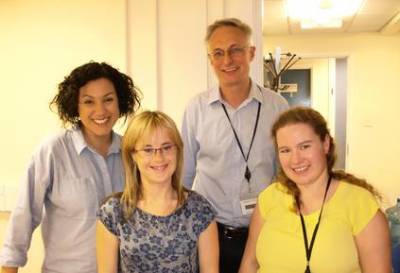
 Close
Close


